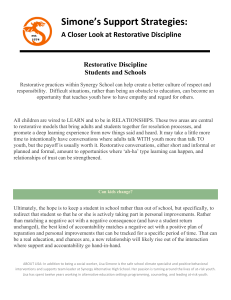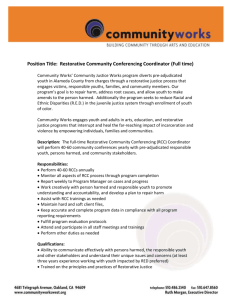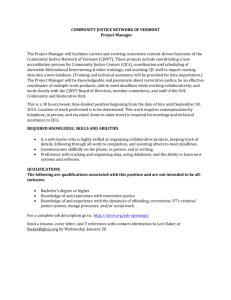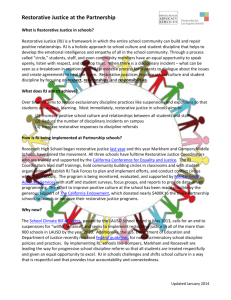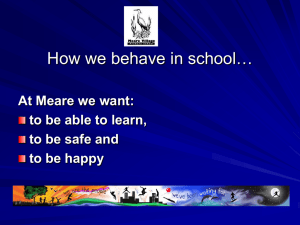School-Based Restorative Justice Kristi Y. Cole Paul C. Dedinsky
advertisement
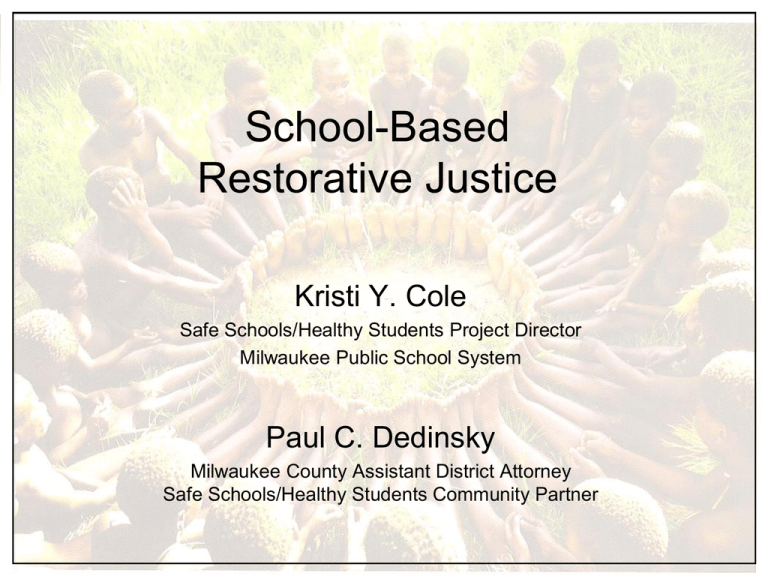
School-Based Restorative Justice Kristi Y. Cole Safe Schools/Healthy Students Project Director Milwaukee Public School System Paul C. Dedinsky Milwaukee County Assistant District Attorney Safe Schools/Healthy Students Community Partner Restorative Justice • Philosophical approach • A set of practices, processes, & strategies • Discipline in the context of harm to relationships rather than violation of a rule School-Based Restorative Justice Aims to: – create healthy, relationship-based environments where harm and wrongdoing is minimized – repair relationships where harm or wrongdoing has occurred while strengthening and transforming a sense of community Views on Misconduct and Discipline Punitive Discipline Restorative Discipline • Misconduct = violation of rules and authority • Misconduct = violation of people and relationships • Violations create guilt/shame • Violations create obligations • Justice = school authority determines blame and imposes punishment in hierarchical fashion • Justice = efforts of those harmed, those responsible for harming another, and school members to make things right • Central focus: those who misbehave get what they deserve • Central focus: the needs of those harmed/ offender responsibility PBIS Pyramid of Behavioral Programs Focused . Intervention Intervention (RJ: Intervention Circles) Prevention (RJ: Community Building Circles) Whole-School Approach Rebuilding Relationships Intensive Support Repairing Relationships Targeted Support Managing Difficulties and Disruptions Targeted Support Reaffirming Relationships: Developing Social and Emotional Skills Universal Support B. Morrison, 2007 Restorative Justice: Supports and Accountability control (limit-setting, discipline) HIGH LOW TO WITH punitive restorative authoritarian authoritative NOT FOR neglectful permissive irresponsible paternalistic support (encouragement, nurture) HIGH Restorative Practices Continuum Wachtel, 2003 MPS Implementation Process I: Planning and Leadership Coordinate, Cooperate, Collaborate, Co-Create, Co-Initiate, Co-Evolve • • • • • • MPS Strategic Planning: Working Together—Achieving More (2007-2012) Restorative Justice Research: Literature Review & Site Visit Building the Partnership: MPS Milwaukee DA’s office Know People & Understand History & Know District’s Current Mental Models DATA Assessment of District Needs Assessment for each school site II: Building Capacity: Buy In – Investment – Ownership Train, Model, Learn, Respond, Support and REPEAT • • • • Assess the Paradigm: Does school really want to become restorative? Train and support Adult facilitators Train and support Student facilitators… then let Students take the LEAD! Troubleshoot, Problem solve, Evaluate, Learn, Grow, PR and REPEAT Rebuilding Relationships: 3 Types of Circles Community Building Circles Students, Teachers, Leadership, Staff, Parents Conflict Resolution Circles Individual Interventions for Students Curriculum Circles Classroom Teaching & Student Involvement Those who are harmed / victimized: Have a choice in how they want to proceed Have an opportunity to talk about what happened Have a voice in how to right wrongs done to them Have a way to feel some power, safety or reassurance Riestenberg, MDE Those who do harm (offenders): Have a chance to be responsible for their actions Have opportunity to right their wrongs & Have a chance to be part of the solution Can learn from what happened & Have an opportunity to develop empathy Can get assistance to alter or change behavior Riestenberg, MDE Ways to Integrate & Reaffirm Relationships Relational practices School/ classroom policies Curricula Social skills Restorative language Adult modeling Support for staff emotional health and well-being Systems that support parent/ career involvement Ways to Integrate & Manage Difficulties and Disruptions Positive relationship building and rule enforcing in • Hallways • Cafeteria • Playground • Outside School Ways to Integrate & Repair Relationships Harm/Justice circles Community-bldg circles Small group support Reconnection meetings Restorative thinking plans Reintegration circles “The challenge is to be in circle when you are not in circle” -ROCA
